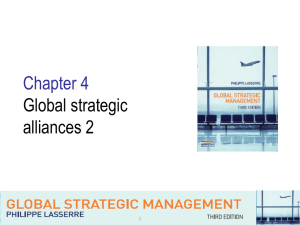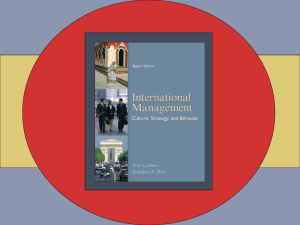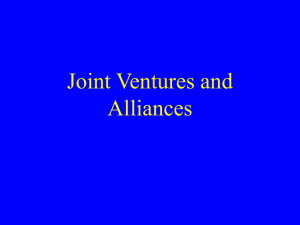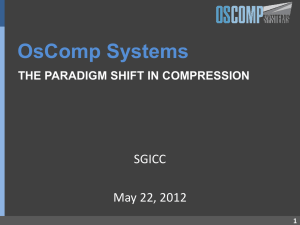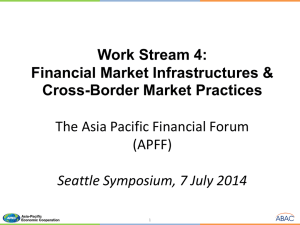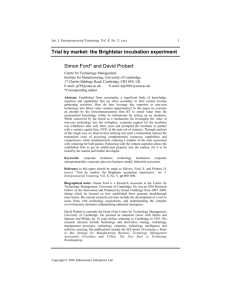Research Assistance Grant or Maxi Grant Application
advertisement
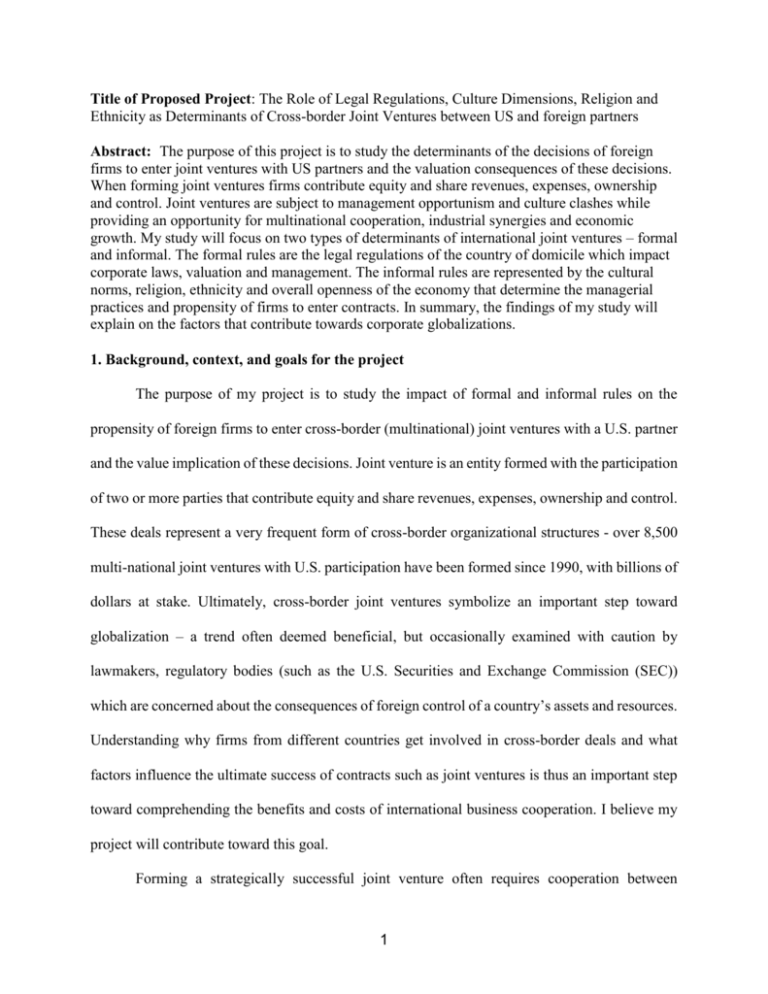
Title of Proposed Project: The Role of Legal Regulations, Culture Dimensions, Religion and Ethnicity as Determinants of Cross-border Joint Ventures between US and foreign partners Abstract: The purpose of this project is to study the determinants of the decisions of foreign firms to enter joint ventures with US partners and the valuation consequences of these decisions. When forming joint ventures firms contribute equity and share revenues, expenses, ownership and control. Joint ventures are subject to management opportunism and culture clashes while providing an opportunity for multinational cooperation, industrial synergies and economic growth. My study will focus on two types of determinants of international joint ventures – formal and informal. The formal rules are the legal regulations of the country of domicile which impact corporate laws, valuation and management. The informal rules are represented by the cultural norms, religion, ethnicity and overall openness of the economy that determine the managerial practices and propensity of firms to enter contracts. In summary, the findings of my study will explain on the factors that contribute towards corporate globalizations. 1. Background, context, and goals for the project The purpose of my project is to study the impact of formal and informal rules on the propensity of foreign firms to enter cross-border (multinational) joint ventures with a U.S. partner and the value implication of these decisions. Joint venture is an entity formed with the participation of two or more parties that contribute equity and share revenues, expenses, ownership and control. These deals represent a very frequent form of cross-border organizational structures - over 8,500 multi-national joint ventures with U.S. participation have been formed since 1990, with billions of dollars at stake. Ultimately, cross-border joint ventures symbolize an important step toward globalization – a trend often deemed beneficial, but occasionally examined with caution by lawmakers, regulatory bodies (such as the U.S. Securities and Exchange Commission (SEC)) which are concerned about the consequences of foreign control of a country’s assets and resources. Understanding why firms from different countries get involved in cross-border deals and what factors influence the ultimate success of contracts such as joint ventures is thus an important step toward comprehending the benefits and costs of international business cooperation. I believe my project will contribute toward this goal. Forming a strategically successful joint venture often requires cooperation between 1 subjects from different countries. The willingness of firms to enter such deals and the success of the new enterprise will depend on formal rules (participants’ countries legal systems) and informal rules (cultural, religious, or ethnic differences) that determine the “compatibility” between contracting partners. Differences in legal regulation across countries create different levels of investor protection. Finance literature has shown that a stricter regulatory environment is beneficial for economic growth - it is associated with better developed capital markets, easier financing, and lower risks of investor expropriation (La Porta et al, 1998; Johnson et al., 2000; La Porta et al., 2002). In addition to formal legal rules there are informal rules that impact corporate behavior across countries. Culture characteristics (such as individualistic vs. group mentality, openness), religion, and ethnicity can influence investor’s behavior, risk aversion, banking practices, and corporate ownership. For example individualistic societies tend to have more active financial markets associated with the confidence of investors (Chui et al, 2005) and culture clashes are often cited as a reason for the failure of cross-border acquisitions (Chakrabarti et al, 2008). My project will involve statistical analysis methods aimed at finding factors that will determine the likelihood of a firm entering a cross-border joint venture and will build on papers dealing with the determinants of country differences (La Porta et al, 1998, 2000; Rossi et al, 2004; Jandik et al, 2008, Chakrabarti et al, 2008). My project will also include a detailed analysis of financial success of such transactions. I expect to examine a variety of stock return and accounting measures, and anticipate that evidence of overall value created by these deals will be particularly interesting for both academicians and policy-makers. 2 2. Plan of work In the initial stage, I have already collected a preliminary dataset of all cross-border joint ventures from SDC Global Platinum database and a list of accounting variables for international firms from Compustat Global database. In the next step, after cleaning up my initial database, I will add several country-specific characteristics. To create legal regulation indicators of each country I will follow the work of Siegel (2007) and La Porta et al. (2000). I will add corresponding variables for country culture dimensions following Hofstede (1980), such as the openness to trade with US will be measured by the import, export and foreign direct investments data from the World Bank Development Indicators (2007 Edition), the CIA Factbook (for religion, language and ethnicity background), and other culture dimensions variables. To examine the impact of the quality of the legal and regulatory environment of a foreign country, I will utilize the research of (La Porta et al., 1998, 2000). To examine the issues of “openness” and “positive attitude toward free trade”, I will investigate the impact of US Foreign Direct Investments (FDI) as well as the export/import activity of a foreign country (Busse and Hefeker, 2007). I will also consider the impact of non-formal rules that stem from similarities in tradition and shared beliefs – e.g. culture and religion (Chakrabarti et al., 2008; Djankov, Liesh, Shleifer, 2007, LLSV 2006, Stulz and Williamson 2003). On one hand, the differences between subjects from very disparate cultures diminishing the attractiveness of deals between foreign and US firms is potentially explained as culture being an obstacle to achieve potential integration benefits (Stahl and Voigt, 2008). On the other hand, culture can result in an increase in value when the venture is successful (Chakrabarti et al., 2008). After the sample is created, I will focus on empirical analysis which will involve performing statistical tests and drawing conclusions on the: 1) propensity (or calculated 3 probability) of firms to enter joint ventures as explained by a set of firm and country legal and culture variables, 2) the short and long-term valuation results of these decisions and 3) the suggested results and implications for the global economy. This is a time consuming project due to the volume of hand collected data as well the amount of statistical empirical work involved. 3. Project's value I anticipate both academic and practitioner impact of this project. The issues of the benefits of international cooperation and creation of cross-border firm entities are very timely, considering recent trends towards globalization. They have attracted considerable attention by finance researchers, as well by policy-makers, and regulators (especially by the SEC). With the help of the Research Assistance Grant, my study will provide evidence on the benefits of formation of crossborder joint ventures, the valuation consequences of such decisions, and the impact of legal regulations and social, cultural and moral factors on global cooperation. Ultimately, I expect not only to publish my results in a quality finance journal, but also to share them with policy-makers interested in establishing the proper mix of laws and regulations governing cooperation among firms from different countries. Equally importantly, I plan to incorporate the findings of this study in my classroom. In a world of rapid globalization it is important for future managers and financial analysts to understand the factors that drive the cross-border integration of corporate activities. Furthermore, my study will provide an insight on the impact of culture dimension such as mentality, religion and group identity on cross-border joint ventures. 4. Evaluation and Dissemination of the project This project will be a continuation of my research efforts in the area of International Finance, which I already had the opportunity to present at multiple university seminars, and 4 regional and international conferences. Consequently, I expect that upon completion of this project, I will be able to present my results at a major finance conference as well (I am aiming for the 2010 Financial Management Association International conference). After receiving feedback, I plan to submit the study for publication in a top international business journal (I am aiming for the Journal of International Business Studies). Equally importantly, I plan to become an active participant in discussions regarding optimal regulatory practices for international business deals. As the first step, I expect that the results of my study will allow me to be an informed contributor to solicited comments regarding U.S. SEC proposed regulations. APPENDIX 1 – TIMETABLE Completed data collection of cultural dimensions, religion, ethnicity, individualism/group identity, national masculinity vs. femininity and additional culture dimensions from the World Bank Indicators by the end of the Spring semester of 2009 Finalized matching sample of Foreign firms and their US partners in the cross-border joint venture by the beginning of the Fall Semester of 2009 Identify hypotheses and complete the empirical work (which includes statistical analysis) by the End of the Fall Semester of 2009 Submit the paper to for the FMA conference by the January 2010 deadline Work on revisions, present the paper at the 2010 FMA meeting, update the results and submit for publication by the end of the year 2010. 5



